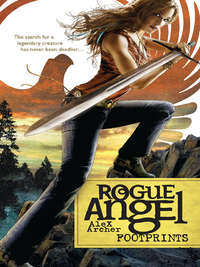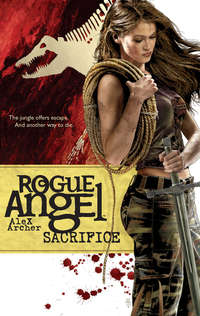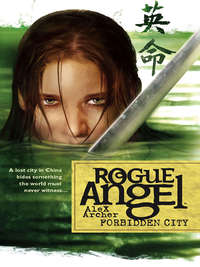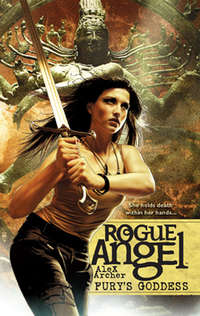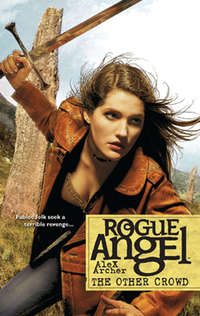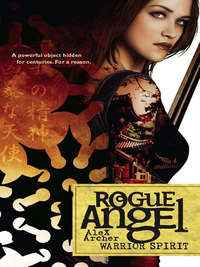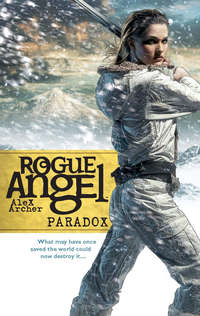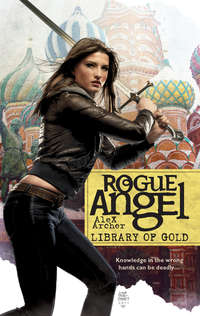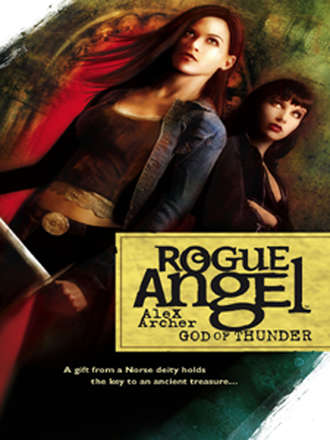
Полная версия
God Of Thunder

God of Thunder
Alex Archer

Contents
Prologue
Chapter 1
Chapter 2
Chapter 3
Chapter 4
Chapter 5
Chapter 6
Chapter 7
Chapter 8
Chapter 9
Chapter 10
Chapter 11
Chapter 12
Chapter 13
Chapter 14
Chapter 15
Chapter 16
Chapter 17
Chapter 18
Chapter 19
Chapter 20
Chapter 21
Chapter 22
Chapter 23
Chapter 24
Chapter 25
Chapter 26
Chapter 27
Chapter 28
Chapter 29
Chapter 30
Chapter 31
Chapter 32
Chapter 33
Chapter 34
Chapter 35
Chapter 36
Chapter 37
Epilogue
Prologue
Courland
Baltic Sea
1104 A.D.
Death slipped into the village with the thick fog that boiled in from the Baltic Sea. It came in on cat’s feet, but took shape as a raiding party. The warriors had been too long at sea and too long without seizing a proper treasure. This morning under the storm gathering over them, they hoped to change their luck.
Skagul, called Ironhand, led the way. He was the chieftain. A large man, well over six feet in height, he was massively muscled from a life spent working hardscrabble earth in his homeland for a harsh existence. His dirty blond beard, rimed with sea salt, hung down to his mid-chest. Tiny figurines carved of wood, stone and ivory hung in his beard and the long hair he wore pulled back in a ponytail.
The reindeer hide he’d added to his tunic to ward off blows and arrows was cracked with age but still supple and serviceable beneath the thick bearskin cloak. A metal helmet covered his head.
He carried a long-handled war ax in his right hand. His left hand was gone, replaced by a cruelly curved iron hook. Sixteen years earlier, he’d lost the hand in a battle with an opposing tribe. His father had been a blacksmith when he hadn’t gone raiding. Together, they’d fitted Skagul with the hook. He was short a hand, but he’d added an incredible weapon to his arsenal.
Senses tingling, Skagul trotted through the ice-cold ankle-deep tidewaters. The longship was nearly flat bottomed and could be sailed or rowed in only inches of water. In his years spent raiding, he’d taken his vessel across oceans, as well as upriver.
His heart beat quickly in his chest, warming him against the touch of early winter and the coming storm. The raiding season was almost over. It they didn’t take a prize soon, there would be little to show for their efforts when they returned home before winter settled.
Ahead of them, the village sat quiet and still, frosted by the light snow that had come during the night. Most of the houses were wooden one-room affairs much like the longhouses in Skagul’s village. Judging by the smoke from a few cook fires curling into the pink-hued sky, only a few people were up.
Goats bleated in small lean-tos behind many of the houses. Roosters crowed to greet the new day. A few dogs lounged in the lean-tos, as well, sharing space and warmth with the goats.
That suited Skagul and met with his expectations. The animals could be a problem, but men just crawling out of bed were often thickheaded and slow to react. He was gambling everything he had on this effort, wanting to go back to his people victoriously.
Victory meant wealth.
Behind them, the incoming tide lapped at the shore and birds cried overhead as they skirled through the sky. The dark clouds sailed the leaden sky with greater speed. The wind had picked up, buffeting the Norsemen as they hunkered down in the brush at the edge of the village.
Holding up his war ax, Skagul glanced over his shoulder.
There, in the rolling fog under the storm clouds, he spotted the dragon prow of his ship. Snarling and savage, the dragon looked fierce and hungry. Heavy red and white sails lay furled on the masts, ready at a moment’s notice. When raised, the mainsail displayed a snake, mouth open and fangs distended.
Skagul’s heart swelled with pride. Her name was Striking Serpent and she had earned her name many times over. She was a twenty-oar ship with sixty-three crewmen. There had been more, but twelve had died fighting the Finns and others had been lost along the way. Since Skagul had been chosen to command the vessel, he’d always been successful.
This, though, had been his hardest year. Only a few weeks earlier, a band of Finns had attacked them at camp and stolen away with all their goods. They’d lost everything they’d spent months stealing.
Skagul would not return home empty-handed with so many mouths to feed. Nor would he see his young crewmen return without bride-price.
“Archers,” Skagul growled.
Twenty warriors peeled away from the group. They nocked arrows to their longbows.
“There.” Skagul waved toward the forested low hills ringing the north side of the village. The land and the trees provided a windbreak against the freezing north winds, which was probably why the village had been built there.
The warriors went at once. They were mostly silent, but Skagul heard some of their gear ring and bang as they took up positions along the hills.
No one in the village noticed.
Standing, Skagul hefted his war ax. The storm winds pulled at his beard and hair. He ignored the cold and moved forward. If things went well, the villagers would take one look at them and surrender everything they had.
The dogs started barking, then ran out to challenge the invaders. Their sharp teeth flashed and snapped. The Norsemen growled.
Skagul swung his ax, cleaving the skull of one dog and killing it instantly. Other warriors killed more of them, and they left the furry corpses behind them.
The goats bleated and chickens ran for cover.
Something was wrong. The feeling coiled and twisted through Skagul’s belly like his ship’s namesake. He held up his ax, calling his warriors to a halt.
The Norsemen stopped, forming a ragged line.
No one peered from the windows of the huts or came to the doors.
Skagul pointed at his men. “You three. Check the homes.”
Immediately the warriors ran to the nearest hut. They broke down the door with their axes. The sharp crack of splintering wood cut through the whirling air. One of them went inside and returned almost immediately.
“No one’s inside,” the warrior announced.
“Check them all,” Skagul ordered. As the men went to do so, he strode angrily to the center of the village. He cursed violently, knowing that the spying they’d done the night before hadn’t gone unnoticed.
“Norseman!” a voice rang out.
Spinning, lifting his war ax, Skagul peered to the east and spotted a man standing almost hidden among the branches of a tall spruce tree. He wore reindeer hide in much the same fashion as the Norsemen but stood empty-handed. His skin was too light to be one of the Curonians, but Skagul knew they were in Courland. The man’s beard was fiery red.
“I am Skagul,” the Norseman roared.
“I’ve heard of you, Ironhand.”
Skagul waited but the other man didn’t introduce himself. “Who are you?” Skagul demanded to know.
“Your death if it comes to that.”
Fury possessed Skagul. For two weeks the frustration he’d felt at the loss of his cargo to the Finns had festered inside him. To be addressed like this, in front of his warriors, was intolerable.
“Brave words from a man hiding in a tree,” Skagul scoffed.
The stranger smiled, calmly and confidently. “I didn’t have to show myself to you at all. I could have put an arrow through your eye.” He paused. “Go to the well and draw the bucket. We’ve left tribute for you. For all your hard work to take what little other people have struggled to gain.” His tone at the end was mocking.
Skagul walked over to the well. He nodded to one of his warriors. The bucket was quickly drawn. He’d expected a trick, but the bucket was filled to the brim with chunks of amber.
The material was valuable and could be used in trade in the Arab lands, as well as with the Franks, Saxons and Celts. Fishermen along the coasts of the North and Baltic Seas dredged amber from the seafloor. Skagul didn’t know why the amber was only found there, but knew its rarity made it more valuable.
“That bucket contains a fortune,” the man in the tree declared. “You’re not welcome to it, but it’s yours for the taking. Accept it and walk away. That way neither side has to lose a life today.”
Skagul gestured. His warrior poured the contents of the bucket into a bag.
“You have more than this,” Skagul told the man in the tree.
“Not for you to take,” the man replied. “I won’t let you strip these people of everything.”
These people. The word choice hung in Skagul’s brain. “You’re not a Curonian.” The more he looked at the man, the more he thought that the man was a Norseman.
“I’m not,” the man agreed. “I was born not far from where you were, but I’m raising my children here. My home is here.”
Skagul nodded and raised his war ax. “As a fellow countryman, I’ll stand you to a proper funeral, then.”
The man in the tree grinned grimly. “Then I’ll extend you the same offer.”
At Skagul’s gesture, the archers loosed arrows that flew straight and true. The man quickly rounded the bole of the tree, disappearing from sight.
The branches deflected most of the arrows, but some of them pierced branches and the tree trunk. Almost immediately, a volley of arrows erupted from the brush, arcing high, then descending on the warriors gathered at the center of the village.
“Shields!” Skagul shouted, throwing himself to cover next to the well.
The Norsemen reacted quickly, hauling their wooden shields overhead. The Curonian arrows found flesh, as well as the shields, though. Eight of Skagul’s warriors went down under the onslaught.
Standing immediately, Skagul grabbed a shield from the nearest dead man and pulled it into place over his head. “Move, you curs! Take the fight to them!” He led the way, pounding toward the huts, slipping through them as more arrows rained death from the sky. He reached the tree line.
The Norsemen ran at his sides as they had always done, axes, hammers and swords raised. They screamed and growled like a wolf pack.
Skagul ran for the tree, not expecting to find the man there, but hoping to catch some sight of him before he was able to escape. Carrying the shield through the heavy brush slowed him only a little.
They climbed a hill, mostly out of sight of the opposing archers, and surged through the forest. Skagul glimpsed the red-bearded man running swiftly through the forest on the other side of a narrow clearing.
“I see him!” one of the Norsemen yelled. “There!”
Skagul surged in pursuit, no longer in the lead because some of the younger men were faster these days. But all of them knew not to range too far ahead so they could be cut into smaller groups.
“Form a line!” Skagul bellowed. “Stay together!”
On the other side of the clearing, the red-bearded man turned and drew a short-hafted war hammer from his back. He stood his ground, glowering at the approaching Norsemen.
A few of Skagul’s archers loosed shafts that bit into the dirt at the man’s boots, tangled in his fur cloak and hit the trees around him. One of the arrows pierced his thigh. Without looking down, the man snapped off the end of the arrow and pulled the other half through his leg. He kept his eyes on the Norsemen.
“Strike now!” the man shouted, raising the hammer above him.
The storm’s fury suddenly increased. Wind whipped through the trees, clacking naked branches against each other and raising gusts of whirling snow. Lightning blazed through the sky and reached down for the hammer in the red-bearded man’s hands.
Yellow flashed on the hammer, revealing that it had been inlaid with amber on the sides of the head and the haft. It looked as if the weapon had been forged of lightning.
The detonation of thunder came immediately on the heels of the lightning strike. A blast of heated air washed over Skagul. When he opened his eyes again, he saw a tree near the red-bearded man topple sideways, trailing smoke.
All the stories about Thor, the Norse god of thunder, who controlled storms and lightning, rushed through Skagul’s mind. He knew the gods sometimes journeyed from Asgard, where they lived, across the Rainbow Bridge to Midgard, which was what they called the human world.
This is no god, Skagul told himself, and told himself to believe it. A god would never have retreated or relied on ambushes. For Skagul saw that was what they had run into as shadows shifted in the forest on both sides of the red-bearded man. Man, he told himself again, not god.
Skagul’s reactions, honed in dozens of deadly encounters, pulled him up sharply. He opened his mouth to shout a warning. Before he could say anything, a withering hail of arrows from the Curonians drove him to cover.
This time Skagul saw the defenders hiding among the trees and brush. They rose only long enough to fire their bows and drop back behind cover.
Two of the Norsemen went down with arrows piercing them. But the others never broke stride, knowing from past experience that within a short distance they would be too close for the archers to fire again. As they raced across the clearing, the ground gave way beneath their feet. In disbelief, Skagul watched his men disappear as if the earth had opened up and swallowed them whole. Lightning flashed again and freezing rain poured from the sky. Less than twenty of the Norsemen pulled back from the edges of the pit that had been covered with branches and dead grass so that it blended with the landscape.
The trap hadn’t been prepared overnight after someone had seen the Norse ship out on the sea. The Curonians had been prepared for an invasion for some time. Skagul thought about the red-bearded man’s statement, that he was raising sons who were Curonians.
It was Redbeard, Skagul thought. He was the one who prepared the Curonians for battle.
A Norse warrior clambered up from the pit. With the rain falling, the earth had turned to greasy black mud. The man was stained with mud and blood. Three thin stakes pierced his body, letting Skagul know the bottom of the pit had been lined with them.
A single arrow flew across the distance and struck the Norseman in the face. The warrior stumbled and went down to his knees. The arrow protruded from one of his eyes through the opening in his helm. He reached for the arrow jutting from his face, then he simply rolled over and vanished once more into the pit.
Curonians charged from the trees. Their bowmen fired arrows over their heads that struck three of the surviving Norsemen.
“Back to the ship!” Skagul yelled. “Back to the ship!”
As undermanned as they were, he didn’t know if they would be successful in getting away. He ran, struggling through the brush.
Redbeard and the Curonians pursued, but they were temporarily slowed by the pit they’d built for defense. Occasional arrows slipped through the forest.
Skagul never slowed, but he heard the thump of heavy footsteps closing on him and knew who it was. Lightning flashed overhead and thunder pealed. Throwing a foot out in the slippery sand of the beach, Skagul slid forward and managed to twist his body at the same time. He brought the war ax around in a flat arc aimed at Redbeard’s midsection.
The amber hammer blocked the ax. Metal clanged as thunder pealed again.
Surprised and more wary, Skagul stepped back and raised his ax in a defensive stance. From the corner of his eye, he watched as Curonian bowmen put shafts into the backs of his men who’d made it to the sea. The Norsemen fell. The survivors of the first wave turned and charged the Curonians, unwilling to be shot down like dogs or taken prisoner. They were slaughtered one by one.
Several of the Curonians surrounded Skagul. They had arrows nocked back to their ears. At that range they couldn’t miss.
Redbeard held up a hand. Blood stained his wounded leg. He spoke in the Curonian language, obviously keeping them from loosing their shafts. To Skagul he said, “I’ve told them they can’t kill you unless I say so.”
“You’d better kill me,” Skagul replied. He was afraid, but his pride wouldn’t let him admit that. He’d always believed he would die in battle, not like a deer run to the ground by hunters.
Redbeard looked at the dead Norsemen lying on the ground around them. “I would prefer not to if I didn’t have to. We’ve already caused the death of too many of our brethren.”
“We?” Skagul scoffed.
Redbeard’s face darkened. “You chose to be greedy.”
“And those men aren’t your brethren.”
“I’ve not always lived among the Curonians,” Redbeard said.
“Where do you hail from?” Skagul asked. He pushed away the fear and tried not to acknowledge the cold that bit at him with sharp teeth.
“Birka.”
Skagul nodded. Birka was an island in Lake Malar. “I’ve been there. I come from Jorvik.”
Redbeard let out a breath. “I could demand payment from your family for your return.”
The offer was a true one, and Skagul knew then that his unwilling host was a Northman at heart. Mannbaetr reflected a man’s value in his tribe, and it was different for each individual. Even if a man killed another man in a fight, he wasn’t put to death as he would be in some cultures. Instead, the killer had to pay the mannbaetr everyone agreed on.
No one was put to death except for adultery, treason or stealing. But the worst punishment that could be doled out to a tribe member was banishment from the community.
Thinking about that, Skagul thought he had leverage that he could use. “They won’t accept a demand from someone who’s been banished.”
“I wasn’t banished,” Redbeard stated. “In my homeland, I was a jarl.”
The declaration surprised Skagul. What was a jarl, a man close to a king, doing living with the Curonians?
The storm raged overhead. Lightning blazed through the sky and leached the color from the world for a moment. The thunder rolled in over the sound of the waves.
Skagul didn’t want to be ransomed back to his village. He wouldn’t accept anything less than going back as a champion. Taking advantage of the lull, he threw himself at Redbeard.
Redbeard knocked Skagul’s ax from his hand, but Skagul had expected that. He kept rushing forward, planting his shoulder in his opponent’s chest and knocking him back. Before Redbeard could recover, two of the Curonian archers had loosed shafts.
Skagul felt the arrows bite into his flesh at his back and side, but he knew from past experience that neither wound would prove fatal. He carried scars from worse encounters.
Wrapping his hand around Redbeard’s face from behind, Skagul melded his body to that of his opponent. Skagul lifted his hook, reaching around in an effort to tear out Redbeard’s throat.
Redbeard lifted the amber hammer. Skagul thought of Thor’s enchanted hammer. It had been crafted by the black elves on orders from Loki, his half brother. The hammer was the most powerful weapon the Norse gods wielded.
Skagul thought the man was lifting the hammer to bring it into battle. It was going to be too little, too late. Skagul had torn out men’s throats before. Nothing would stop him.
Then Skagul saw a tongue of lightning reach down from the dark sky and touch his hook before he could sink the tip into Redbeard’s throat. Skagul lost his hold and flew backward, paralyzed and in agony. He felt as if he were buried in red-hot coals.
On his back in the wet sand, Skagul tried to rise but couldn’t. When he looked down, he saw that the lightning had blown off both his legs. Blood pumped from the stumps and was washed away immediately by the rushing tide.
Redbeard came to him then. Sorrow showed on the man’s face.
“It didn’t have to be this way,” Redbeard said.
Skagul focused on the amber hammer. As he lay dying, he waited to see if the Valkyries would arrive to take him to Valhalla. After all, he’d died a brave death. But he feared they might not because his death hadn’t been a wise one.
Only a fool would have tried to kill a god.
1
The four men approached Annja Creed like a well-oiled machine. Their actions told her they’d done this before.
She didn’t break stride or change direction, heading toward the Mailboxes & Stuff store that she used to mail and receive packages. In her career as an archaeologist, she often received items for study and sometimes for authentication. A handful of museums and private collectors paid her to do certificates of authenticity on items they were putting on display.
Although everything added up, payment for the certificates wasn’t much. However, the benefits included free access to those museums and private collections, and the goodwill of curators who were valuable sources of information when she was doing research.
The four men moved with determination, without speaking. They were young and athletic, casually dressed and instantly forgettable. She guessed that they had military training.
Everything’s already been planned, Annja thought. Adrenaline spiked within her, elevating her heart rate and her senses. She stayed within the flow of the lunch crowd flooding out of the buildings onto the street. Everyone was hurrying to try to make it back on time.
She knew the four men had been waiting for her, and wondered if they had followed her from her loft. She hadn’t been home in weeks. A dig in Florida had consumed her and given her a brief respite from the dregs of winter that still hovered over New York. She’d quickly dropped off luggage and headed back out.
Layered in dark winter clothing—a thigh-length navy wool coat, sweater over a long-sleeved top, and Levi’s, with a knitted black beanie and wraparound blue-tinted sunglasses, her backpack slung over one shoulder—Annja figured the team had watched her closely to recognize her. But at five feet ten and with chestnut-colored hair that dipped below her shoulders, she forgot she had a tendency to stand out in a crowd.
Nikolai, the manager at the shipping business, had left messages with her answering service to let her know she had a number of packages waiting for pickup.
So why hadn’t they picked her up at the airport? Annja mulled that over and realized that they weren’t law-enforcement personnel. Maybe they hadn’t wanted to draw attention to themselves.
Then why hadn’t they nabbed her at her loft? If they knew about Mailboxes & Stuff, they surely knew where she lived. That thought led to a whole new line of questions.
Although it stunk to the high heavens, the situation made Annja curious, and curiosity had driven her through most of her life.
Annja took her cell phone out of her pocket and punched in numbers.
“Mailboxes & Stuff,” a friendly male voice answered. “This is Nikolai. How may I help you?” His Russian accent was charming, but Annja knew it was fake. Nikolai had been born and raised in Brooklyn.
“It’s Annja.”
“Ah, Annja, it is so good to hear from you.” Nikolai lowered his voice to a conspiratorial tone. “You would not believe what has been going on.”


